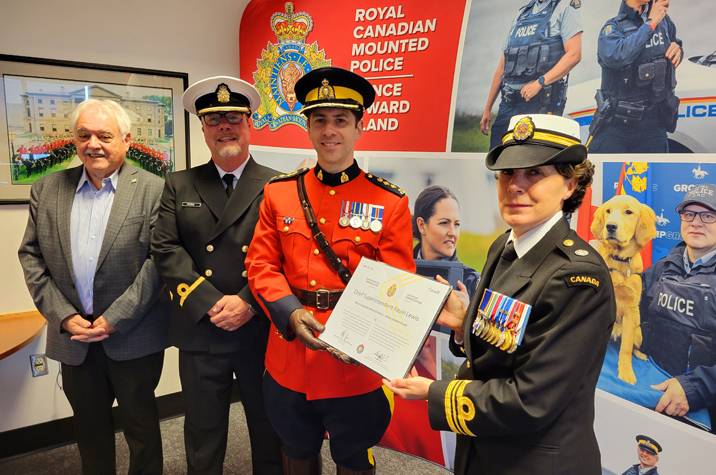Supporting Reservists with flexibility and honour
By Rheanna Philipp

Chief Superintendent Kevin Lewis, and Scott Ferris, senior communications advisor from P.E.I. receive recognition for their flexibility and support of the Canadian Armed Forces Naval Reservist program.
Image by Scott Ferris
October 24, 2024
Content
The Reserve Force is an integral component of the Canadian Armed Forces. The greater part of the force is made up civilians who primarily hold part-time service positions. Many are RCMP employees or post-secondary students, earning them the nickname “citizen soldiers.”
Military leave policies are essential for the Reserve Force to maintain effective numbers and provide training, but there are still a lot of organizations where these policies do not exist.
The RCMP has had military leave policies since 2007.
On June 7. Chief Superintendent Kevin Lewis, who is the commanding officer in P.E.I., received a Certificate of Appreciation from the Chief of Reserves and the Canadian Forces Liaison Council (CFLC). The certificate is to recognize the RCMP's flexibility and ongoing support for Reservists, especially the division’s support of Acting Sub-Lieutenant Scott Ferris, who also works full-time for the RCMP.
Scott Ferris is the senior communications advisor for the RCMP in P.E.I. and is a communications officer for Naval Reserve Unit in Charlottetown.
Ferris faced a unique circumstance with his request for military leave due to his dual responsibility between the organizations. He needed to leave P.E.I. to attend a Naval training exercise in St. John’s Newfoundland but was also on call in his role with the RCMP.
“There had been some concern about leaving the island and not being available,” he says. “If an incident happened on P.E.I., could I still support it?”
After a discussion with Lewis and the senior management team, they came to a compromise. Ferris would be able to attend the naval training exercise while also being able to work from RCMP headquarters in St. John’s if there was an issue.
“Traditionally you just release somebody for a few weeks,” says Lewis. “He was the only person here available to do his role, but we wanted him to have the experience.”
“That accommodation was kind of the first of its type within the division and as such, within the Canadian Armed Forces,” says Ferris.
The RCMP was given a certificate of appreciation by the CFLC to recognize the accommodation.
Meaningful partnerships
Keith Hillier is the chair of the CFLC for Prince Edward Island and sits on its National Committee
The CFLC is an organization comprised of more than 140 Canadian volunteers who work to engage employers, educational institutions and other organizations to emphasize how valuable reserve service is to Canadian communities and their defence.
Hillier says their “goal is to support the Canadian Armed forces” by “supporting reservists and making interventions where necessary.”
“Sometimes there is a myth that reservists aren’t at the same operational capability as full-time soldiers,” says Hillier. “It depends on your particular trade but certainly anyone who’s deployed in combat is.”
Reservists go through a variety of training, sometimes lasting anywhere from a few days to a couple weeks or months. Their availability is integral to Canada’s ability to meet and fulfill its defence commitments.
Hillier says this would not be possible “without the support of employers such as the RCMP.”
Lewis added that the Reservist program has, “provided Ferris with all kinds of new experiences and responsibilities, gives him access to training, that he wouldn't have with the RCMP, that in turn directly benefits us in his Communications role with the division.”
“The skills of RCMP officers and reservists are highly interchangeable,” says Hillier. “Both require the ability to follow standard operating procedures all while using formidable interpersonal skills to de-escalate a situation when necessary.”
Lewis says that he has seen an increased level of confidence, to manage an event and eagerness to take on a leadership role in RCMP members who complete Reservist training.
“We do see a different personality come out of individuals that are in the Reservist program,” says Lewis.
While Ferris is not a police officer, Lewis says that Ferris is ready to jump in and help at a moment’s notice.
“He has the ability to make decisions under pressure to manage people and physical resources, which is essential for the communications position he is in,” says Lewis.
Both Lewis and Hillier say that the close relationship between the two federal agencies is mutually beneficial and that Ferris’ commitment to the two has created a bridge between the organizations.
“When you permit your people to go for training and exercises, they aren’t just having fun being a soldier, a sailor or an air force member,” says Ferris. “They are actually learning something that’s going to bring value back into your organization.”